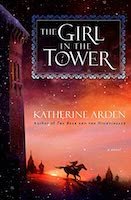5 stars. I am obsessed with this book. I had to re-read the first couple of chapters because of life getting in the way, but once I fell down the rabbit hole there was no climbing back out. I was absolutely gripped by the story and the writing… I thought about it when I was falling asleep and when I woke up in the mornings. I’m considering re-reading it immediately. I can see this book wiggling its way into my life and inspiring references, returns to highlighted quotes, maybe even passwords. I’m definitely about to buy it for myself in all formats.
Andrew Ranulf Blankenship (excellent name) is a skilled user of magic and recovering alcoholic. He has - inadvertently, it seems - developed a sort of found family consisting of other users and the creatures and demons brought about by his spells. When an associate (poor choice of words but you get the drift) of his kills a Russian man, his mother - who turns out to be a very old nemesis of Andrew’s - comes to America for revenge.
And this particular brand of revenge is… brutal. Andrew’s friends are severely threatened or picked off one by one in fantastically unique, magical ways. It reminded me of a slasher at times, because I was always ready and waiting for the next creative kill (as painful as they were). In fact most of the book is, essentially, Andrew’s enemy winning, and Andrew barely surviving at great, great cost. It’s a little too brutal at times.
But the writing - oh man, so good. Reminded me of Stephen King a little bit, with its incredible dialogue and clipped sentence structure. Was better than Stephen King at times, with its pacing and plotting and intentional weirdness. King is great at weird; Buehlman is superb at weird. Nothing about this apparently complex world of magic was too difficult to grasp. Everything unfurled in a brilliantly comprehensible - enjoyable - way.
I do want to point out one little fact that had me screaming in joy: this book scared me. Actually scared me. I read a ton of horror and watch a ton of horror and I’m always looking for the next thing that’ll make me feel something, really feel something, for once. And this book got me there. (For anyone curious: it was the scene where Andrew and Anneke are watching the infected video tape.) It also made me cry.
Let’s talk about that, because around here it’s pretty obvious that I can’t handle a certain type of animal death which is really any type of animal death. It’s partly just an annoying trigger, but also there’s so much of that in horror it almost feels tired, like authors are taking the easy way out or clear advantage of a common and obvious fear. There’s a reason why it’s a trope, but the way it’s utilized often feels bothersome - unnecessary - to me. Which is why I typically dock a star for the UDD (the unnecessary dog death).
I sensed this one coming, and immediately fast forwarded the next three pages of my Kindle, but it was too late. I caught enough of it to start tearing up, and then really crying, on a plane of all places. It’s gotten worse since I got a dog myself. Just tears and tears and tears. And every time I thought about after - tears. I got worried I wouldn’t be able to write this review because I felt so sensitive about it. And so in this case, I really had to think about the utilization of the trope. Was it necessary? Was it done for the sake of being shocking, or did it truly have a narrative purpose? Another example of a tricky one would be The Shining Girls. IYKYK.
At the end of the day I can’t dock a star. It’s too brilliant and too amazing and isn’t it a testament to the writing that I felt so incredibly crushed and exhilarated by Sal’s bittersweet ending? He teased it so many times, he warned us, we knew it was coming. And he twisted the blade there, and oh no… now I’m crying again.
Thank you for sitting through that with me. You’ve been warned. ANYHOO, please, please read this book. I am more and more convinced that this is a fundamental text of horror - a must-read for anyone looking for something refreshing, funny, scary, creative, and deeply, deeply real, at times, for a book about magic. It’s a book for anyone struggling - for anyone who feels like life keepings throwing them punches, one after another, punches of loss, addiction, regret, guilt, rejection… for anyone who feels like punching back for once. The ending is quite satisfying, in that sense.
The Necromancer’s House on: Amazon | Bookshop.org | Goodreads










